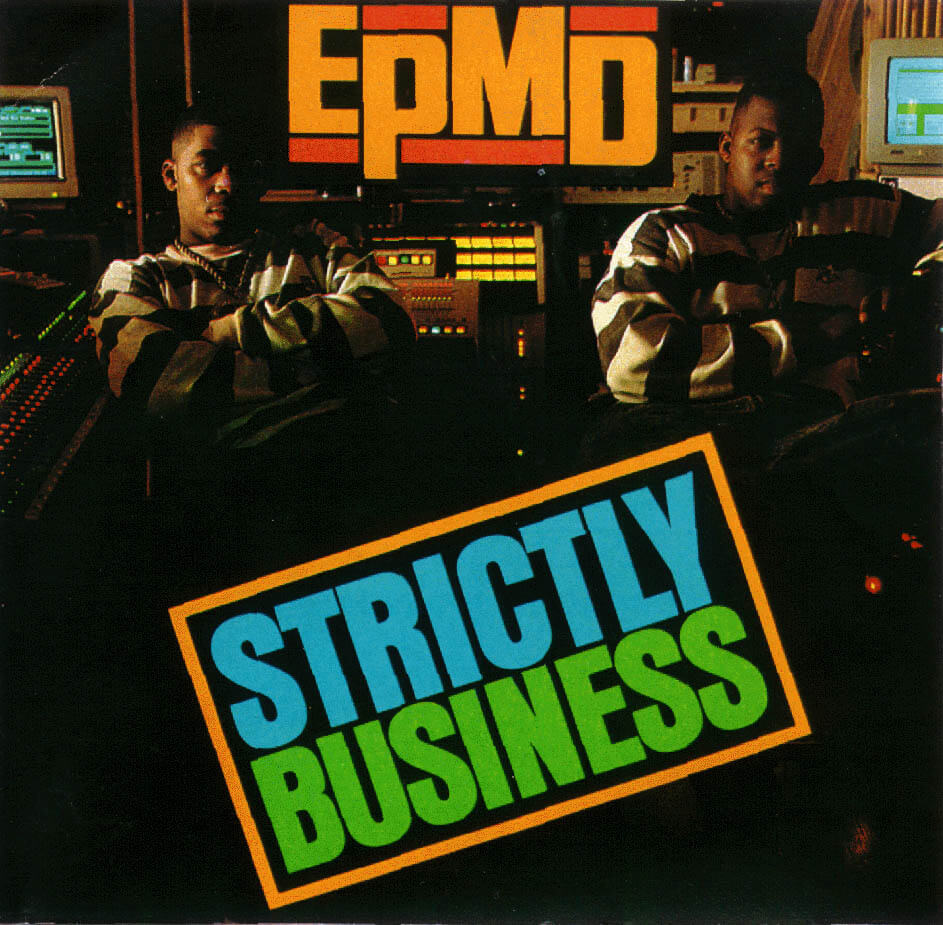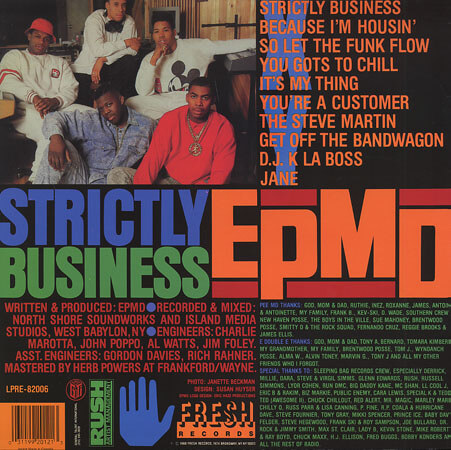For a duo obsessed with leisure and the spoils of Reagan-Era consumerism, Erick Sermon and Parrish Smith rarely seem compelled enough to work for it, at least not at the expense of their relaxed demeanor or enough to warrant naming their album Strictly Business. Even music industry chatter would have been premature at this point, since both rappers were barely out of their teens, working on their debut release and still fearful of parental retribution. Seriously Joking would have better fit the duo’s unfocused vocal brilliance, mirroring their capacity for riffing off of each other and penchant for off-the-cuff one-liners. The compatibility of the pair and their dedication to stressing common verbal and sonic motifs shows a maturity beyond their years, making for an effortlessly meta-advertisement for slackerdom and the artistic honesty that comes with it.
Slurred, slack flows pour out of EPMD in a lispy stream-of-consciousness, heavy on Long Island accent and light on tempo and articulation. The speed and rapidity of the vocal interchanges often result in swallowed words and misheard bars, but the improvised nature is exhilarating and guilelessly poetic. Throwing out ideas and cultural touchstones at random, much like their successors in Das Racist, Erick and Parrish love to investigate pop ephemera (i.e. Samurai Suzuki, Federal Express, “witch Matilda”), but never as indictment of the corrupting power of branding, but as dedicated capitalists, itemizing wishlists in preparation for their big payday. Loose ends are often tied together with a commercial jingle or interpolated song lyric, resulting in an unintended complexity that befits couch potatoes and stoners old enough to pick up on the cultural cues. Others will fare better succumbing to the power of the vocal dynamics, which effortlessly shift between Parrish’s vivid bad cop routine and Erick’s mush-mouthed litany of lyrical peculiarities (“If it gets warm, take off the hot sweater.”)
As if to counter the esoteric nature of the narrative, production takes a demotic approach and sticks to sampling pillars of the 70’s rock and funk movements. Contrasting loops are strung together from two or three familiar sources, marrying the sweetest bits of standards like “I Shot the Sheriff” and ‘”Jungle Boogie” into one recognizable, but unique, whole. Snippets are even alluded to over the course of multiple tracks, cohering divergent passages to key themes and inserting a certain self-referential charm to the proceedings. It’s an elementary technique used for an ingenious construction, best described as the aural equivalent of creating a new outfit from hand-me-down clothes.
Yet, cursory beat plundering and a relaxed demeanor shouldn’t be confused for lack of inspiration, since EPMD merely select the tracks best suited to fit their topics of conversation. While the placid, smoky notes of Bobby Byrd’s organ are a perfect fit for “Let the Funk Flow” and its casually brilliant lyrical schemes, ZZ Top’s “Cheap Sunglasses” is stripped of its pomp and given a glossy electronic makeover. Left behind is a hollow, frigid bass line, ideal for the ill-willed jeremiad of all things poseur on “You’re a Customer.” The residual tension even carries over to DJ K La Boss’ instrumental track, an excerpt so moody and baroque that it would feel wholly separate if it weren’t for the studied repetition, blurry scratch patterns and perfectly situated Vincent Price sample.
Similarly hazy trails of echo coat the blown-out, warped bass and mesmeric soul clap on “You Gots to Chill,” producing a narcotic calm to match the persistence of the choral mantra. The schizophrenic pace of the scratching and distorted talk box vocals (swiped from Zapp & Roger) coax out the gentlest of head nods, predating Dr. Dre’s fascination with the quixotic nature of funk, but with far more emphasis on danceability and vocal interplay. Lyrics are spewed forth without punctuation, too relaxed to give a passing thought to the woeful words of a “sucker MC” or precocious “new jack,” but jokey enough to “issue dig-em-smacks” to those without a clue. There’s even a hint of escapism in the lyrics, challenging the audience to free itself from the worry and self-consciousness that would overwhelm the genre within 4 years time. It’s Sermon who best embodies these good vibrations, allowing Smith to play the role of terse agitator, while likening himself to everything from Zorro to a personal computer and playfully suggesting that inadequate rappers catch up on their beauty rest. His passages of jejune and colorful absurdism are what loosens the audience’s inhibitions, imploring even the tightest of asses to spring from its seat.
Ardor seems to leap forth from every passage of Strictly Business, culminating in “Jane,” a lover-man sex jam spun out of control by a bossy belle less than impressed with meat-and-potatoes coition. Willing to be the brunt of the joke is refreshing, but writing the joke is revolutionary in a genre full of bruised egos and brutish inflexibility. Putting humor and bonhomie before self-importance is what makes this product so desirable and even artists as green as EPMD understand that distinguishing yourself from the competition is half the battle.
EPMD – Strictly Business was ranked #8 on Matt Deapo‘s Hip Hop Top 50, a ranking of 50 of the best Hip Hop albums recorded between 1978 and 2006, based on this consideration and these rules.

